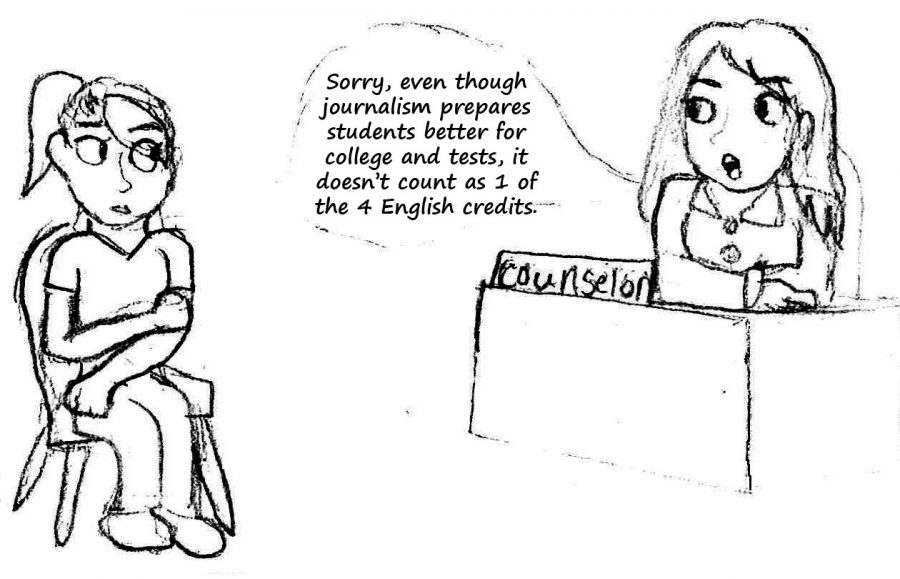Journalism should count as credit
September 28, 2016
Journalism is a part of everyday life and is essential across the globe. The world needs journalists to report daily news so that people are updated on public matters. However, people aren’t born journalists, which is why journalism should not only be a class in high school, but it should count as an English credit.
Students are learning just as much in that class as they are in a regular English class, and even more. Just like any other English class, students write papers, read, debate, practice copy editing (which will really help in collage college), and of course, write for the school newspaper, which is something that students can’t do in a regular English class.
Journalism also teaches students skills that they can use in the real world. Students obtain communication skills by learning how to approach students, teachers, and anyone they don’t know for interviews. It also helps students to strengthen their writing skills and benefit them in writing classes in college by learning what needs to be said and what doesn’t. Also, deadlines are strictly enforced in journalism, so students learn to always turn in papers and articles early or on the deadline date, since missing a deadline would cause the whole school newspaper to be printed late.
The Newspaper Association of America Foundation completed a study of more than 31,000 students and found that students taking journalism perform better in high school and in college. According to naa.org, “High school students who participate in school journalism programs earn significantly higher grade point averages, score better on college entrance exams and demonstrate better writing and grammar skills in college compared with students who had no involvement with their school’s newspaper.”
Now the National Council of Teachers of English (NCTE) have also released a statement in support of Journalism as part of English curriculum, citing studies that show journalism students score higher on AP Language and Composition tests than those who only took AP or honors English classes without journalism.
It is clear that journalism classes in high school positively impact students academically, and better prepare them for life.
Journalism experiences also build strong leadership skills. The following information from naa.org compares percentages of leadership roles between journalists and non-journalists:
* 37.5 % of students with journalism staff experience were appointed to a student office vs. 20.7 % of students with no journalism experience.
* 27.1 % of high school journalism students participated in a student movement to change institutional rules, procedures or policies compared to 17.9% of those without journalism experience.
* More than half (50.9 %) received an award or special recognition for leadership of any kind vs. 38.4 %.
As editors of the school newspaper, we can truly say that journalism has helped us so much in school, and it has given us skills that we didn’t think we needed in life or skills we didn’t even know how to get.
We have found our voices both through writing and communication because journalism has helped us to break out of our shells and get out in the world. We have gotten to know more people and students of all grades and have developed certain relationships with teachers and staff that really make high school more enjoyable.
Sadly, many students who would like to take journalism class cannot fit it into their schedule because they still have to take four years of traditional English classes.
By allowing journalism to be counted for one of the four required English credits, more students will be able to take advantage of the many benefits it provides.



